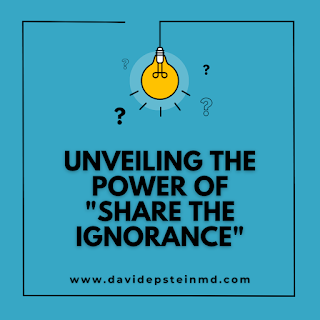“Share the ignorance” is what a previous mentor of mine would say when he came up against a difficult case in the pediatric intensive care unit. I thought it was a peculiar and somewhat cynical way of expressing that you needed help. But, knowing him and his slightly eccentric way of shooting off colorful comments to describe critical, challenging, or contentious situations, it made sense. However, reflecting back on his statement of “share the ignorance”, it was more profound than what I had appreciated when I first heard it in my pediatric critical care training.
At first, I thought it was funny or clever. But, now, “share the ignorance” means so much more. As I’ve matured in my career and learned more, I realize what I don’t know. Knowing what you don’t know is something that is paramount to growing and learning because it reveals the blind spots and deficits to improve upon. So, to “share the ignorance” of a difficult clinical case means to display a sense of humility in admitting that you don’t know the answer and need the help of others.
The Changing Landscape of Medicine
We all need help at one point or another. In medicine, the time is long gone when any one person can be depended upon to know the compendium of information necessary to treat all patients. The extent of medical sub-specialization is staggering. There is even a sub-specialization of sub-specialists. For example, there was a doctor (long ago) who would care for every medical need. Then, neurology developed to care for newfound neurologic diseases. Then, pediatric neurology evolved for kids and their specific issues. Then, within pediatric neurology, there developed further sub-specialization in epilepsy, movement disorders, neuroimmunology, and others. So, one person can’t know everything, even within a specific subspecialty! It is natural to seek the assistance of others and it should be the expectation, rather than exception.
Learning Together
Seeking the assistance of others when you are unsure about something or don’t know the answer to a particular question is important. It shows a level of insight about one’s limitations and acknowledges the fact that others have value and can contribute. By actively eliciting the help of others, you are open to others’ input and their insight. It is a form of collaboration and a way of furthering your knowledge by listening to them. And, in the event that they don’t know the answer either, it is a good way to “share the ignorance” and learn something together.
Have you ever encountered a situation in your professional or personal life where admitting ignorance or seeking help led to a positive outcome? Share your experience.

Comments
Post a Comment